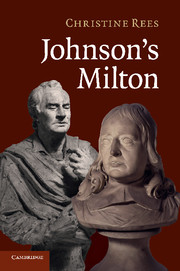Book contents
- Frontmatter
- Contents
- Acknowledgements
- List of abbreviations
- Introduction: Johnson and Milton
- PART I JOHNSON THE READER/WRITER: APPROPRIATING MILTON'S TEXTS
- 1 Summoning Milton's ghost: Miltonic allusion in the periodical essays
- 2 ‘No Miltonian Fire’? Miltonic allusion in Johnson's poetry
- 3 Rasselas: a rewriting of Paradise Lost?
- 4 ‘Licence they mean when they cry liberty’: the 1770s tracts
- PART II JOHNSON THE CRITIC: ASSESSING MILTON'S ACHIEVEMENT
- PART III JOHNSON THE BIOGRAPHER: CONSTRUCTING MILTON'S CHARACTER
- Notes
- Select bibliography
- Index
2 - ‘No Miltonian Fire’? Miltonic allusion in Johnson's poetry
Published online by Cambridge University Press: 05 October 2010
- Frontmatter
- Contents
- Acknowledgements
- List of abbreviations
- Introduction: Johnson and Milton
- PART I JOHNSON THE READER/WRITER: APPROPRIATING MILTON'S TEXTS
- 1 Summoning Milton's ghost: Miltonic allusion in the periodical essays
- 2 ‘No Miltonian Fire’? Miltonic allusion in Johnson's poetry
- 3 Rasselas: a rewriting of Paradise Lost?
- 4 ‘Licence they mean when they cry liberty’: the 1770s tracts
- PART II JOHNSON THE CRITIC: ASSESSING MILTON'S ACHIEVEMENT
- PART III JOHNSON THE BIOGRAPHER: CONSTRUCTING MILTON'S CHARACTER
- Notes
- Select bibliography
- Index
Summary
The eminence of Milton looms over eighteenth-century English poets far more than it does for prose writers, and they devise different strategies for thriving in, or escaping from, that shadow. In this, Johnson resembles many of his contemporaries; but his use of Miltonic allusion, especially in his mature poetry, is far from merely imitative or deferential. In particular, he challenges the reader to reconsider the original context in the light of his own appropriations. Moreover, his choices in prosody and diction set up an alternative poetic discourse for the treatment of certain subjects; he competes for territory with Milton. Comparisons and contrasts between Johnson's poetry and Milton's are worth making because they contribute to explaining why he reads Milton as he does. As T. S. Eliot, himself an eminent poet-critic, has asserted, ‘unless we know and appreciate Johnson's poetry we cannot judge either the merits or the limitations of his criticism.’ Comparisons are also worth making because of what they reveal about how Johnson the poet reacts to and against his reading of Milton's poetry. Close observation of his practice of allusion yields valuable clues about how far he remembers or resists the poetry of his mighty predecessor.
JUVENILIA
In the ‘Life of Milton’, Johnson expresses the view that:
Milton never learned the art of doing little things with grace; he overlooked the milder excellence of suavity and softness; he was a Lion that had no skill in dandling the Kid.
(Lives I. p. 278)- Type
- Chapter
- Information
- Johnson's Milton , pp. 31 - 57Publisher: Cambridge University PressPrint publication year: 2010



